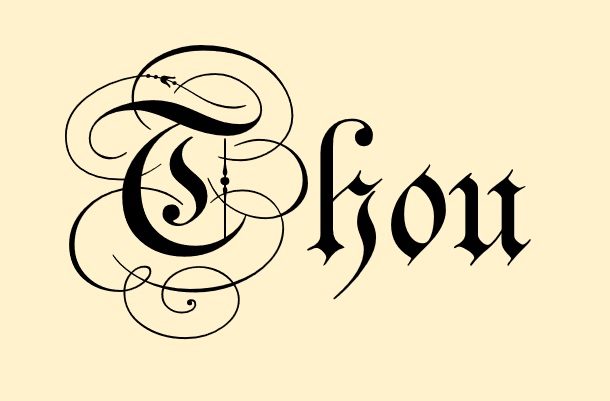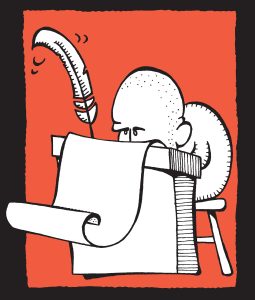Here’s a crazy idea that might work.
In English, “they” has become the preferred third person singular pronoun, for gender-neutral use. But of course, we use the same pronoun for the third person plural. That creates confusion. Why not revise the pronoun’s spelling when it’s singular? Why not switch out the “e” for an “a,” without changing the pronunciation?
You’d need only a few words of explanation. “In this [article/book], I use ‘thay,’ ‘thair,’ and ‘tham’ as third person singular pronouns, equivalent to ‘they,’ ‘their,’ and ‘them.’ I use the latter three solely as third person plural pronouns.“
Doing the pronoun expansion better this time
 Our language has broadened use of a pronoun before. Old English used “thou” for the second person singular and “you” for the plural. But during the Middle Ages, English speakers gradually adopted “you” for the singular. And they dropped “thou.” (It did survive for a while as a familiar version of the singular pronoun. During Shakespeare’s time, it played a role like “tú” in Spanish: a familiar version of “you” and not as respectful as “usted,” the other word for “you.”)
Our language has broadened use of a pronoun before. Old English used “thou” for the second person singular and “you” for the plural. But during the Middle Ages, English speakers gradually adopted “you” for the singular. And they dropped “thou.” (It did survive for a while as a familiar version of the singular pronoun. During Shakespeare’s time, it played a role like “tú” in Spanish: a familiar version of “you” and not as respectful as “usted,” the other word for “you.”)
Thanks to that Medieval shift, we often can’t tell today what “you” means. We can’t tell whether it’s singular or plural.
Today’s pronoun shift has the same impact. With an expanded “they,” we often can’t tell singular from plural. Obviously, the language survived and thrived last time. But why not add clarity where we can, at least in writing?
The “thay” pronoun in action
- “Thay can can offer suggestions by e-mail.”
- “This is thair chance to speak up.”
- “Give tham your feedback.”
OK, those look like a spelling errors. But we’d get used to it. And you can easily hit “ignore all” in your spell-checker — or “add to dictionary.”
The beauty of this switch: it adds clarity to writing without requiring a change in speech.
What about verb conjugation?
 Grammar purists might prefer a change in verb conjugation as well. Most people today use singular “they” with verbs conjugated for the plural. We say “they run,” the typical plural use, even when “they” is singular. If we adopt this “thay” spelling change, should we also switch to singular conjugation: e.g., “thay runs” – or “thay has good grammar”?
Grammar purists might prefer a change in verb conjugation as well. Most people today use singular “they” with verbs conjugated for the plural. We say “they run,” the typical plural use, even when “they” is singular. If we adopt this “thay” spelling change, should we also switch to singular conjugation: e.g., “thay runs” – or “thay has good grammar”?
Such a conjugation switch would make sense … but I doubt anyone will do it. We’d be changing spoken English. Fat chance.
Anyway, the English language didn’t “fix” conjugation when “you” expanded its role. We conjugate “you” as if it were plural, even when it’s singular. We say, “you run,” regardless of what we mean by “you.”
Pronoun workarounds and respect
Of course, you could just write your way around singular/plural confusion by avoiding the third person pronoun altogether, at least when gender isn’t defined. For instance: “The author should sign the author’s name on the dotted line” (instead of “sign his/her/thair name”). But that’s a bit painful.
Worse, that denies non-binary people any pronoun. It gives third person singular pronouns only to the majority, who comfortably rely on “he” or “she.” Better to use “they” for both plural and singular – and maybe better still to use “thay.”
In this post, I mean to address an issue in our ever-evolving language – while respecting those most touched by that issue. If I’ve failed on the latter front, I am sorry, and I’d like to know. You can write to me below, in the comments section.
© 2021 by David W. Tollen – All rights reserved.
Thank you to Pixabay.com for the great, free stock images!



Using “thay” instead of “they” as a gender neutral pronoun makes so much sense. It’s hard for me, after decades of life, to accept the use of the latter as a singular pronoun, although it’s much better than the s/he I’ve seen at times. Your suggestion is the best solution I’ve seen yet to resolve the issue
Thank you, Janet! Let’s spread the word. Maybe this will catch on.
But, first, ‘they’ and ‘thay’ are pronounced differently.
Second, ‘usted’ is no longer a polite form of address in most Latin American countries.
Third, and most important, language is a live organism and will do as it pleases as far as form choices. But one can always play with it!
from our linguist friend….
Actually, I think we can pronounce “thay” however we like. And my proposal is NOT to try and change the way anyone speaks. Too hard. So I’d pronounce “thay” “thair,” and “tham” exactly the same as “they,” “their,” and “them.” And English language spelling creates no obstacle. Vowels are very flexible. For instance, “say” already has the same vowel sound as “they.” We’re already there in terms of pronouncing “thay” like “they” … rhyming w/ “say.”
As for language changing how it pleases, that’s right. But individuals do influence it. For instance, one prickly Latin purist decided English should not split infinitives because Latin doesn’t (can’t). Thus was created a pain-in-the butt English grammar rule followed religiously for centuries. The change proposed here, on the other hand, would create no structural inconvenience, much less spoken changes. Just a one-letter switch.